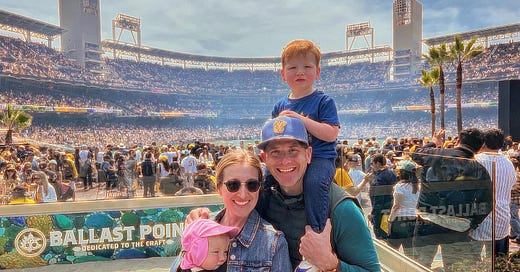From the US Naval Academy to NASCAR: Interview with Managing Director of Sports Betting at NASCAR, Joseph Solosky
What do the US Naval Academy, the Yankees, the FBI, a European company specializing in sports betting data, and NASCAR have in common? The answer is this week’s interviewee, Joseph Solosky.
Joe was inspired to join the military post 9/11 and found his way to the US Naval Academy. A serious back injury led to an unexpected honorable discharge just 10 months after his graduation. For the first time in his life, Joe found himself at a loss for what would come next. In the years that followed, his story would take him to an internship at the New York Yankees, the FBI, living overseas in Germany where he worked at a European sports betting company called SportsRadar, and finally to NASCAR where he landed his current role as Managing Director of Sports Betting.
Curious? I know I was. This week’s interview is broken down into two parts:
Part I covers Joe’s story in his words including:
How an impulse trip to spring training in Florida led to an impromptu internship offer at the Yankees
How he landed a job at the FBI while working at a restaurant next to the Hoover building
Jumping into the sports betting world in Europe
How a cold linkedin message led him to NASCAR
Part 2 covers lessons from what he’s learned along the way including:
The value in learning to shoot your shot
Learning to manage the ebbs and flows of success
How he’s found his way to self-belief
Note: The following interview has been lightly edited for clarity and length. While every effort has been made to preserve the integrity of the conversation, please be aware that the quotes may not be verbatim but reflect the essence of the dialogue.
Part I: Joe’s Story
You started your career at the US Naval Academy and today you are the head of sports betting at NASCAR. How did you get to where you are today?
I wanted to join the military because of September 11th. I grew up in New York and was of an age where it hit close to home. I wanted to join the military, but my parents wouldn't let me enlist early. My dad was very emotionally intelligent in the way that he pushed me towards different branches of the military. He encouraged me to look at the service academies and ROTC options which is how I ended up at the Naval Academy. I had a wonderful experience there.
Typically, you go to a service academy with the intent of serving for 5 to 20+ years. When I graduated, I was on the path to becoming a naval aviator and was placed in a temporary job until flight school. During that time, I got a bad back injury and ultimately got medically disqualified from flight school. Normally that is just a minor setback. You transition to another role and you continue on your military path. However, this happened in October 2008 when the military was doing a force reduction and someone who didn't have a particular skill yet wasn’t needed. They said, “Hey, you’re getting out in 5 months.” So instead of doing 5 years of service, I did 10 months.
I was honorably discharged and found myself not knowing what to do for the first time in my life. I didn't have any money. Honestly, the first thing I thought was, “I'm a huge Yankees fan. Let me take advantage of this last week I have of being able to wear my uniform.” I flew down to spring training and wore my uniform. What I hoped would happen was that someone from the team would see me in my uniform, let me go on the field, I’d talk to some players and take pictures, and then one of the coaches would talk to me. Fortunately, that plan worked. One of the coaches came over and said, “Thank you for your service. We just had a bunch of navy seals from MacDill come over and speak to us. It was super inspiring. What do you do?” I told him my story and that I was getting out. He offered me an internship for the season on the spot. The internship literally started that night.
I ended up doing an unpaid internship with the Yankees for that entire season. It was a great experience, and they were kind enough to offer me another unpaid internship at the end of the season. At that point, I had even less money than I started with so I declined and moved back to DC. I decided to pursue a career in public service again. I don't think it was more well-thought-out than my Yankees plan. I just thought that working for the FBI would be really cool. I had no “in” to the FBI so I applied for a job at a restaurant next door to the Hoover building waiting tables. I thought I might meet someone who could give me a job, and that's ultimately what happened. I waited tables for 4 months until another Naval Academy graduate saw that I was wearing my ring. He asked me, “Who'd you steal that ring from?” I told him my story and he created a job for me at the FBI. That’s what set off my first real career.
I joined the FBI and pretty quickly thereafter realized that I wanted to become a special agent. I worked really hard as an analyst in the cyber division and started gaining mentors to help me navigate the application process for Special Agent. Over the span of 4 to 5 years, I switched jobs within the FBI to have a more high-profile, high-visibility job that would help me with my application. I ultimately got through the special agent application process but in that timeframe, life happened. I’d met my soon-to-be wife. She’d graduated law school and been accepted into the Army’s JAG program. Her first duty assignment was in Germany overseas. The career path of FBI special agent and overseas army officer does not result in a compatible cohabitation environment. I was 30 years old and had seven more years to go back to the FBI before I was disqualified by my age. I said, “Hey, let's live overseas. I don't know if I'll work. I don't care if I work. She's making enough money in the army. I can come back to the FBI when we move back to the US.”
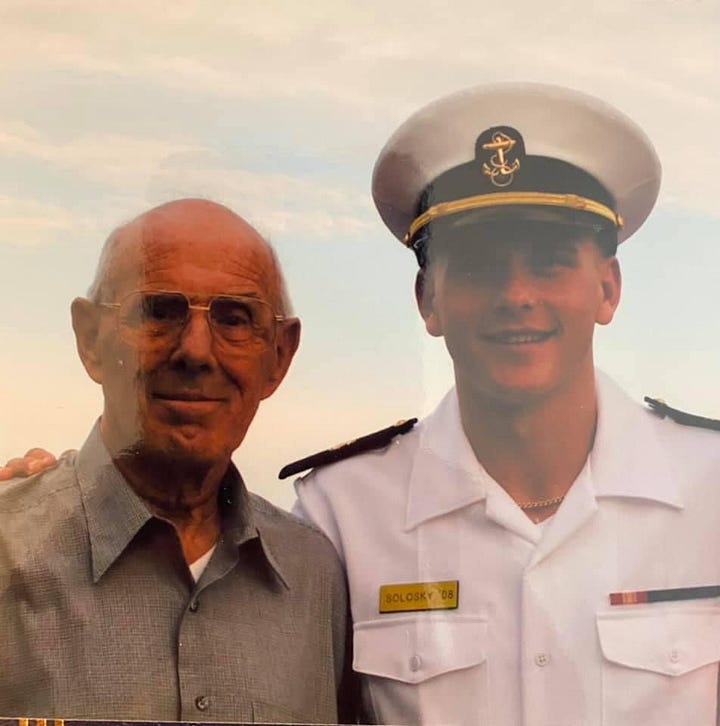
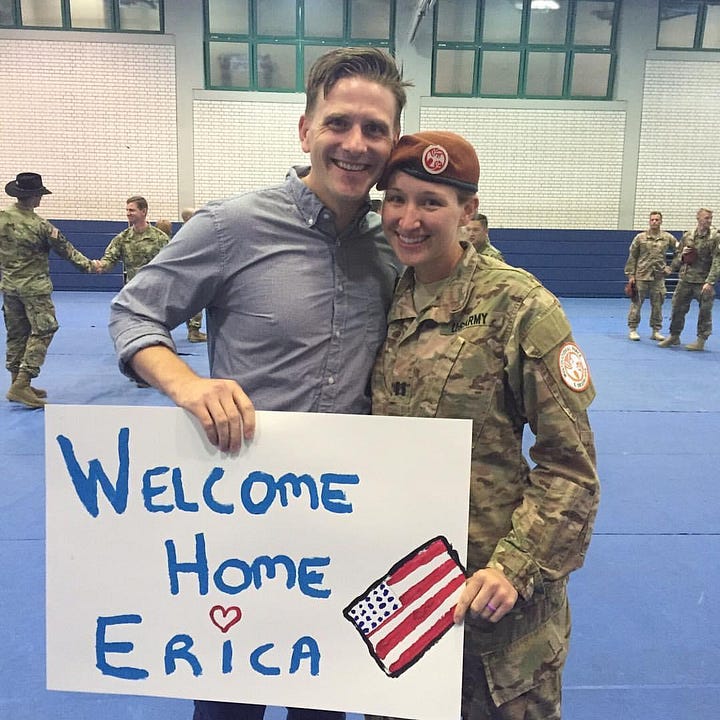
We moved overseas to Germany, and I got bored after a month or two. I started to write for a sports blog for free. I was doing interviews researching companies who were involved in the sports technology space and began to learn how the sports betting industry was maturing. As I realized how mature and legal the sports betting space was becoming overseas, I started applying for jobs in the sports betting world. I thought I’d do it while we lived in Germany, and then I’d return to the FBI. I ended up working for a company called Sportradar for 6 years. They hired me to do sales for them in the African and Asian betting markets, which was incredibly difficult from a learning curve and cultural immersion perspective. Going from public service in the military to aggressive sales in international markets was not easy, but it was a lot of fun and involved a ton of good travel.
When our time in Germany was up, my wife got stationed at West Point. Sports betting had been legalized in the US around that time, and the company I was working for kept me on to establish a presence for them in the US. I wasn't passionate about the sports betting industry. It was kind of a job. I became a professional interviewer for the next three years in the US while I looked for new opportunities. Nothing ever panned out. Right before covid, I started to realize that my background in sports betting was very unique and not something that not many Americans had. There were organizations and companies who were not necessarily in the sports betting space but might value hiring someone like me. I looked at all the American sports leagues to see what they were doing in the sports betting world. Ultimately, NASCAR had a role open for someone to oversee their sports betting initiative. I reached out to the person who was the hiring manager for that job on Linkedin, shared my experience, put my hat in the ring, and was ultimately selected for the job.
I’m three years into that role at NASCAR. My wife got out of the army. We moved to Charlotte and have had 2 kids. I really love working for NASCAR and have fallen in love with the sport.
Part 2: Lessons from the Journey
I want to go back to a few key moments from your story: flying to spring training in Florida, working at a restaurant next to the FBI, writing for a sports blog to get into sports betting. It would have been easy to say, “These are bad ideas. I don’t have the network or qualifications. I’ll just give up and do something else.” What mindset gave you the ability to get creative and say, “Why not try?”
I had a lot of support. None of these decisions I made were on my own; they were done in consultation with my family, my wife, and my friends. Even if I didn’t have faith in myself or the trust that things would work out, I had friends and family who did. It sticks in your head if your dad or someone you really trust says, “No, it’s something you could do really well in. You should pursue this.”
I remember with the Yankees. I had a girlfriend back in DC at the time and didn’t think it made sense to move to New York. Fortunately, I had a friend shake me and say, “Are you crazy? You’re the biggest Yankees fan in the world. You should do this. How many times are you going to be 23 years old and have this opportunity?” It was the same with the Sportradar job. I kept trying to make excuses not to take it. My wife said, “We don’t have kids. I’m going to be deploying. Why not give this a shot?” The point is that I had a really great support system that helped me quell the negative voices in my head.
What do you think those experiences taught you about the value of shooting your shot?
I haven’t found any downsides to shooting your shot within appropriate measure. There's a time and place for doing things to make yourself stand out. I have an example from this week. NASCAR does a wonderful summer internship program, and I had a call with one of our interns in Daytona. She reached out to schedule 45 minutes with me to talk about my role. I really valued her doing that. I told her, “This is something that makes you stand out. If we never talk again, but in 5 years you reach out and ask for a favor, I'll remember this.” We have 35 other interns and no one else has reached out.
There were definitely extreme ways I tried to make myself stand out or shoot my shot that fell flat, but nothing that ever made me feel like I had egg on my face, or that I should regret doing it.
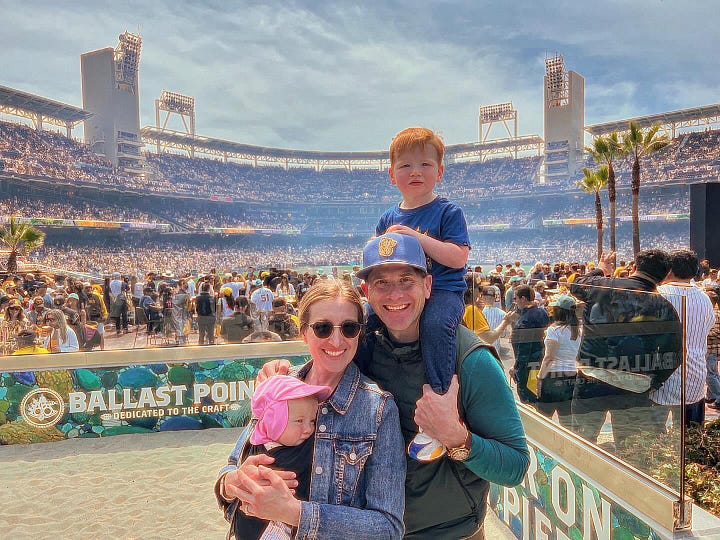

It sounds like it all happened very linearly, but I'm sure at the time it didn't feel that way at all. Were there ever moments where you felt lost or doubted that you’d be successful one day? If so, what helped shake you out of those moments and keep going?
I definitely felt that way when we moved overseas to Germany. I felt a lot of imposter syndrome, especially when I compared myself to my peer group. My 3 or 4 closest friends from the military either had successful careers in the military or had gotten out and were building their own companies and becoming CEOs in the tech world, and here I was not having a job. I was enjoying my life no doubt. I spent a lot of time traveling and spending quality time with my newlywed wife. However, from a career perspective, I felt behind and like everyone was flying past me. The feeling of, “What am I doing?” definitely pushed me to find work. That’s how I ultimately found myself in the sports betting space. During those three years in Germany, most of my friends really didn't know what I did. Sports betting wasn’t legal or really known in the US at that time. When they came over and visited me, I was super proud to tell them about the technology behind sports betting and the data side. Looking back, I think it was less about educating them about what I did and more about impressing them because I was comparing myself. They didn't make me feel that way. Those feelings didn’t really stop until we got to spend more time together in person when I moved back to the US. I realized that they felt the same way about me that I did about them. They never looked down on me no matter what I did. It was really the comparison that I was doing that made me feel lost.
I think one of the challenging things in building a business or undertaking an unconventional career path is encountering all the moments that feel like stops and starts. At the time, those moments can feel like failing or falling behind. With the benefit of hindsight, you can look back and say, “I needed every one of those moments to figure out what I'm doing now.” Does that resonate with you? If it does, what would you tell someone about the stop and starts and the nonlinear reality of an unconventional path?
I’m definitely still working on that, although I do think I’ve gotten better at going with the ebbs and flows of success, whether it’s a positive email you receive from a client or an unexpected phone call from your boss who thinks your latest idea is the worst idea ever. I used to ride the highs until I’d get to the next high or low. I think what helped me stop doing that was becoming more aware of that pattern and not letting myself get too excited about a little thing, or stopping myself from living off that moment for longer than I should be. On the converse, I’d pay more attention to not letting myself get too low. I don’t know if there was one lightbulb moment that got me there. Maybe it was just maturity and dealing with enough of those highs and lows to realize that I needed to live more in the middle.
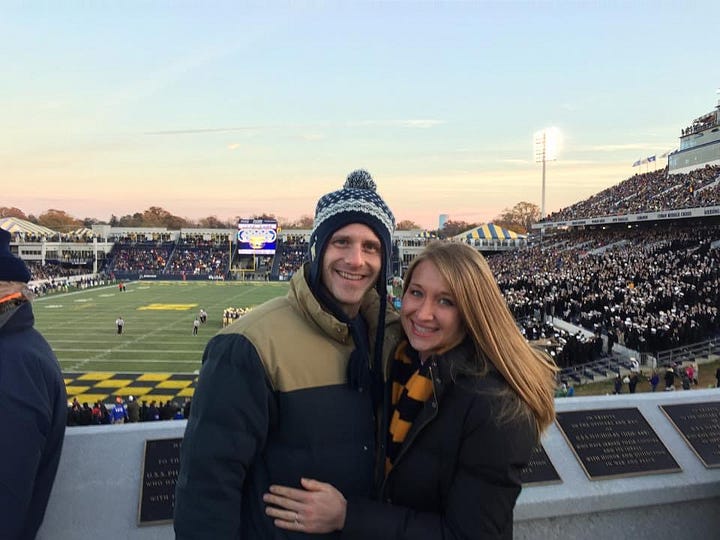

What was the impact of constantly living on highs and lows?
There was no stability. It very much impacted not just how I felt in that moment and how I felt about work, but also how I’d go into a workout afterward or enter a conversation with my wife. Yes, the positives are great but when you start to live in the negatives, it’s not good.
The job at NASCAR has helped because I have much better work/life balance than I did at Sportradar. That’s not to say anything bad about my time at Sportradar. I really enjoyed it, but because I was in sales there was really no getting away from my job. I also have kids now, and they really put things in perspective. When my kids are home from daycare, I’m with them and not focusing on work as much. I’m not letting a message on my phone or a notification cause me to immediately grab my phone and ruminate on how I’m going to respond. Getting older and growing my family has given me a lot more stability in that sense.
I think we’re all working on that one. You mentioned that one of the things that really helped you early on in your career was having a supportive network of people who pushed you to go for things, even when you didn’t always believe in yourself. Now that you’re older and further into your career, what have you learned about self-belief?
I have a lot more self-belief now than I ever have. I had total imposter syndrome during my entire six years at Sportradar. I didn't have any background in sports betting and felt like the company really took a chance on me. I worked for someone who was very demanding, but I knew he always had my back. I thought the only reason I was safe and secure in my job was because I was under my boss' umbrella. I really felt like I was faking it until I made it for 6 years. There were 2,000 people at that company who lived, ate, and breathed sports betting, and I didn’t know the space at all. When I came to NASCAR, I realized quickly that I am the sports betting person at the company, and what I say about sports betting is how the company moves forward. I think being in that position and becoming the trusted subject matter expert has made me much more confident. I can now recognize that I do know this space really well. This is what I've been doing for 10 years.
I’m also a lot more confident in how I make decisions in my job, how I work with other people, and how I communicate what I do to others because I realize that NASCAR is not a sports betting company. I really made an effort when I first started to try and meet everyone in the company, go to every division, and do a presentation on what sports betting is. I talked to people about things like why it was illegal and why it’s legal now. What’s the impact on NASCAR? Why did they hire me? What do I plan to do? I knew that I was going to have to learn the sport from people I worked with and work with different divisions to be successful in my job. I think that helped me build credibility internally. I collaborate with many other people now because I’m the person who understands the category. People will look at me and ask, “What's the answer? Sports betting guy tell us what this means.” I can tell they believe what I say because I built credibility internally and have the experience to back it up.
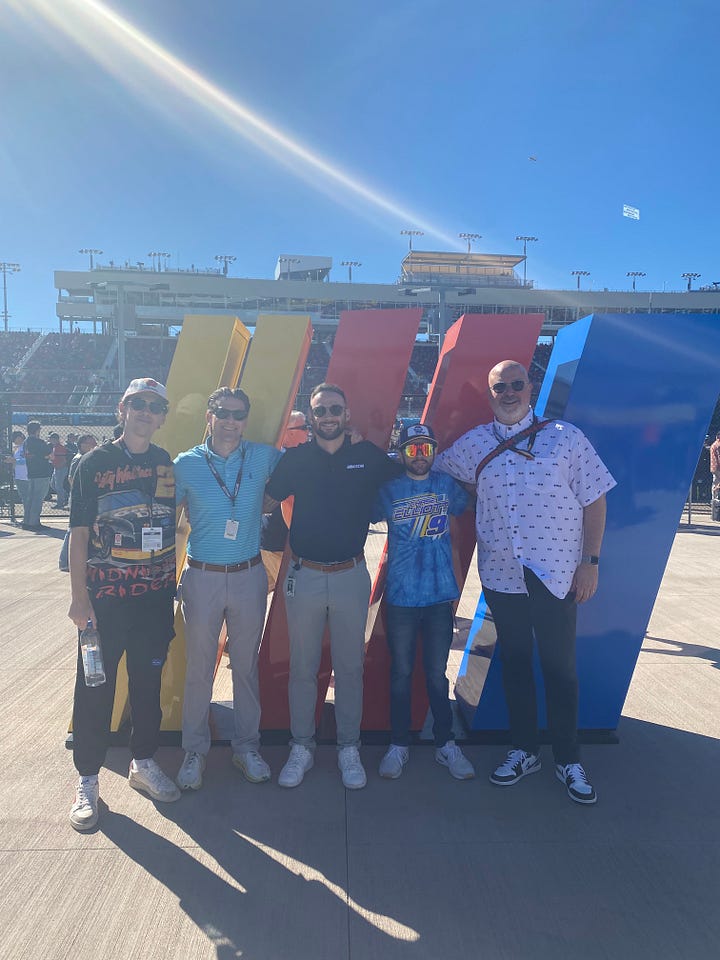
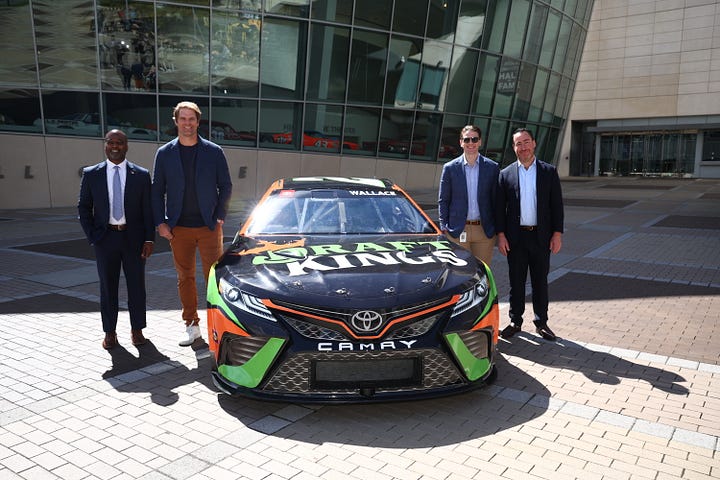
I coach people all the time who are working on the way they mentally approach risk. The goal is to help them build the mental muscle to be able to handle the risks of whatever they're doing so that they can evaluate them, but not let doing so overwhelm them to the point where they can’t move forward or are impeded in their ability to make decisions. What have you learned about managing risk in your role?
There’s always a lot of due diligence in anything I do. After 10 years of working in the space, I know a lot of people who know the space even better than I do. If I'm looking at a new partnership or maybe a new gaming vertical that other leagues aren’t involved in yet, I will try to understand other perspectives first. Why aren’t the other leagues involved? Is it because of optics? Or is there not enough upside? I will talk to those leagues and industry experts to hopefully get answers. When I talk to experts I trust, I’ll say, “Is this something, or is it nothing?” I usually think it's something, and they’ll either talk me off the ledge if it’s nothing or onto the ledge if it’s something that has more opportunity than I previously thought.
I very rarely, if ever, make a decision that has some level of associated risk without any consultation. In areas that could be viewed as potentially risky to the business of NASCAR, I will work with people who know the industry really well and have had to make a similar decision before making a call. I put all the feedback together with what I think is the right way to move forward and then make the decision.
It sounds like you say, “Okay, here are the questions that I want to answer. If we're going to do this at all, let's go get those answers. Once we have them, I’m not going to ruminate on this into obscurity. If we get those answers, I'm okay moving forward rather than getting lost in the endless ‘what ifs?’”
Yeah, I’m more of a “let's make the decision once we've given it the due diligence and thought processing.” As long as there’s some level of comfort around moving forward then let’s allow the “what ifs?” to happen. Hopefully, we've prepared for those, and I've got a team of people I can lean on. I want to feel comfortable with the decision based on the process that I went through. As long as that’s the case, I’m comfortable moving forward and tackling the roadblocks as they come.
Many people I interview for the No Directions blog have created lives that are uniquely theirs in terms of how they live, work, and build their lives. What does the life that is uniquely yours look like today?
I can’t think of any way to answer that question other than thinking of my family first. One of the things I really like about my job now is that NASCAR is a family-run organization. I’ve always prided myself on associating with groups that had a larger mission. I think that's what drove me towards the Navy, the FBI, and the Yankees. It wasn’t there as much at Sportradar. I missed that sense of being part of something that was bigger than myself, and that's what really drew me to NASCAR. I feel like my family is very much a part of my work. When I travel sometimes I bring them with me. My son loves the sport.
In times when I've had those low moments of “Oh man, am I doing a good job?”, the biggest fear that comes into my head is how disappointed my son would be if I lost my job. He loves NASCAR. As silly as that sounds, I think that drives home the point of how tied in what I do and how proud I am of the sport is with how proud I am of my family and the life that is uniquely mine.
I've created a pretty good work-life balance of doing a really good job and having a lot of self-confidence in what I do. When I’m with my family, I shut off and focus on them because I know that my time spent at work was time well spent.

